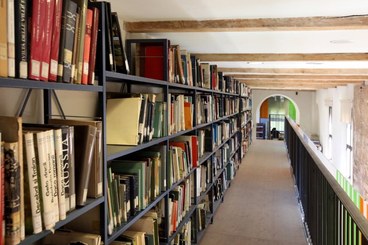- Home
- Progetto Apri sottomenù
- Istituzioni
- Persone
-
Attività
Apri sottomenù
- First Exploratory Workshop - Bologna 18-19 maggio 2021
- Panel alla Conferenza annuale EASR 2021 - Pisa 30 agosto-3 settembre 2021
- Research Foresight Workshop - Cracovia 1-2 febbraio 2022
- Convegno annuale della CUSR - Palazzo Feltrinelli di Gargnano, Lago di Garda 08-10 settembre 2022
- Conference "Theory and Methods in the study of the Greek Ritual Terminology"
- Lessico concettuale
- Agenda
- Collana LARES Apri sottomenù
- FORMAZIONE
- ERASMUS + BLENDED INTENSIVE PROGRAM FOTOGALLERY
- LEXICON OF THE GREEK RITUAL TERMINOLOGY

Attività
Convegni Seminari e Giornate di studio
18-19 maggio 2021 - Università di Bologna (evento on line)
First Exploratory Workshop - Percorsi interdisciplinari della ricerca storico-religiosa sul mondo antico. Temi, concetti, prospettive
ll primo workshop esplorativo è stato organizzato - attraverso incontri virtuali preliminari tra i coordinatori dell'équipe - sotto forma di conversazioni aperte strutturate attorno ad alcune parole-chiave e concetti che possono aiutare a definire le differenze interculturali e interdisciplinari attraverso una prospettiva multipla. I partecipanti saranno incoraggiati ad avviare esplorazioni congiunte di percorsi di ricerca e gettare le basi per un progetto comune attorno ad un Lessico dell’acculturazione religiosa nell'antichità.
30 agosto-03 settembre 2021 - Università di Pisa (modalità mista)
18ma EASR - European Association for the Study of Religions Annual Conference: Resilient Religions
IAHR Regional Conference (https://www.easr2021.org/)
PANEL SESSION - Coping with the krisis. Phenomena of religious acculturation and enculturation: Patterns and policies of resilience from the Hellenistic-Roman period and Late Antiquity
Focusing on the Hellenistic age and Late Antiquity as two turning points that marked radical changes “in the ancient political systems, social structures, religious beliefs, philosophical thinking, economic models and cultural trends”, the session aims to explore policies and strategies of transition, transformation and mutation with related repercussions on the level of collective and individual perception and creation of new patterns of adaptation, absorption or even resistance capable of facing the collapse of ontologies that results from transformation and, thus,of ensuring the survival of groups and individuals.
1-2 febbraio 2022 - Università Jagiellonica di Cracovia (evento online)
Research Foresight Workshop - Lexical Change and Variation in Ancient Religious Enculturation / Acculturation phenomena
Il seminario di previsione della ricerca (Research Foresight Workshop) si propone di valutare i risultati delle esplorazioni congiunte che hanno animato il primo incontro del progetto (Exploratory Workshop) confluito nel "Convegno internazionale Percorsi interdisciplinari della ricerca storico-religiosa sul mondo antico: temi, concetti, prospettive" (Bologna, 18-19 maggio 2021) e di ulteriori ricerche dei partecipanti al progetto. I partner delle quattro università coinvolte si occuperanno di individuare – con il supporto dei futuri partecipanti – i temi principali che verranno analizzati e poi mostrati congiuntamente. Le ricerche discusse nel workshop saranno il frutto di una stretta collaborazione tra personalità accademiche con background disciplinare ed esperienze diverse, in linea con l'idea di collaborazione e alleanza affermata dalla rete UNA Europa. Saranno discusse anche future opportunità di finanziamento della ricerca finalizzate alla costruzione e implementazione del Lessico LARES sulla lunga durata (project – Excellence Initiative – Research University, Jagiellonian of Kraków e Erasmus + Blended Intensive Programme, Università di Bologna).
8-10 settembre 2022 - Palazzo Feltrinelli di Gargnano sul Lago di Garda
Convegno annuale della CUSR - Consulta Universitaria di Storia delle Religioni - Dire e fare. Laboratorio per un lessico storico-religioso
Il convegno nasce dall'auspicio di attivare un laboratorio permanente sul lessico storico-religioso: su come si costruisce, sui termini più importanti e rappresentativi, sul loro valore in senso ampio, anche storico, e sul loro uso (PROGRAMMA IN FASE DI ELABORAZIONE).
Titolo dell'intervento proposto: "How to work with words" (Erasmus plus Blended Intensive Program): Il progetto LARES per un lessico digitalizzato dell'acculturazione religiosa nell'antichità.
25-28 gennaio 2024 - Jagiellonian University in Krakow
International Conference - Theory and Methods in the Study of Greek Ritual Terminology
The change of the Christian paradigm in modern culture has turned the attention of specialists and the broad community of researchers in the humanities and social sciences to the philosophical, linguistic, and cultural contexts of the roots of European religious and philosophical culture. The study of the ancient religion in the Greek world as well as in other ancient cultures of the Mediterranean, with a strong emphasis on their fundamental importance for understanding the religious phenomena of modernity, seems to be a flourishing and dominating area of research on antiquity. Since “ritual” as a modern concept is used for a classification of phenomena from an outsider point of view, it should be approached also from an insider perspective. The best way to achieve the goal is the complex analysis of emic terms concerning various performative practices regulating the relationship between humans and super-human beings. The Greek technical terms of the language of ritual require linguistic, semantic, philological, and historical explication in conjunction with religious studies, anthropological, and cross-cultural descriptions. The first phase of the study, of critical importance, includes the methodological preparation, clear consideration and evaluation of the status quaestionis of the research on Greek ritual terminology and setting of further research directions, integration of researchers and students dealing with technical language of ritual.
Materiale informativo Attività - Convegni
-
Bologna 18-19 maggio 2021
-
Bologna 18-19 maggio 2021
-
Pisa 30 agosto - 03 settembre 2021
-
Cracovia 1-2 febbraio 2022
CFP INTERNATIONAL CONFERENCE IN KRAKOW, JAGIELLONIAN UNIVERSITY, JANUARY 25-28, 2024
Al momento non sono presenti eventi in corso